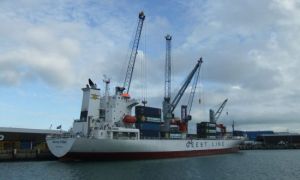Feature, Freight News, Sea
Geest Line goes back to Portsmouth
[ August 29, 2019 // Chris ]Caribbean shipping line Geest Line is returning to Portsmouth two years after relocating to Dover. It moved its UK call to the Kent port due to scheduling difficulties at Portsmouth, which have now been resolved. Geest Line’s headquarters and its 32 staff remained in Hampshire.
Geest operates weekly westbound sailings from the south of England and the Netherlands.
Managing director, Captain Peter Dixon, said: “We left Portsmouth because of scheduling difficulties when we replaced our fleet with five larger and newer ships, increasing our capacity by 40%. The port at Dover was able to accommodate us and enabled our business to
continue and grow. But changes at Portsmouth mean it can now handle our larger and modified service and it makes sense to return.”
Geest handles reefer and non-reefer container and breakbulk cargo, with most traffic from the Caribbean consisting of fruit, mainly bananas, for the UK and European markets.
Cllr Gerald Vernon-Jackson, leader of Portsmouth City Council, said: “This strengthens Portsmouth’s reputation for international trade and demonstrates the importance of investing in Portico, so it can provide a return on investment for the city and protect jobs. We’re now responsible for handling over 70% of bananas coming into the UK.”
Portsmouth is embarking on a diversification programme that will see it add new traffics to its traditional staples of fruit and ferries, says port director Mike Sellers. In an interview with FBJ, he outlined plans to refigure the port and attract a range of new business, while maintaining its presence in its two existing major sectors.
The city council, which owns both the port and the Portico stevedoring business (rebranded from MMD earlier this year) has reapproved the port’s existing 20-year plan and has made a £15 million capital loan to Portico to help the latter realise its full potential and return to full profitability.
Sellers said: “Our business plan is to keep fruit as our core business but also open up the port to general cargo such as containers, projects and bulks.”
He adds that over the past 12 months, Portsmouth has already handled project freight, including 82 metre long windmill blades barged in from the MHI Vestas factory on the Isle of Wight and which are transferred to deepsea vessel in Portsmouth, sea-dredged aggregates and containers. “This is all business that we wouldn’t have had in the past, when we were known primarily as a fruit port,” Sellers explains.
He also has hopes of attracting short-sea container operators, possibly from France or Spain.
On the reefer side of the business, Portsmouth has won a new weekly Seatrade palletised fruit service from South America, which now operates alongside the existing Maersk container reefer service from Colombia.
To better handle the fruit business, the port is in the middle of a programme to demolish old quayside warehouses, install 220 new reefer points and to build an additional four-storey, 6,000 pallet storage area between two existing warehouses to facilitate cross-docking and increase pallet capacity by 25%.
The quayside will also be reconfigured to improve traffic flow and allow truck drivers to check in at the gate rather than having to park up after entry and then check in.
Sellers points out that Portsmouth currently has plenty of berth capacity; it is storage for containers and pallets that is currently the main constraint on growth. Maximum ship size that can be handled is around 1,500teu or 230m long and 11.5m draft – more than adequate for the trades that Portsmouth handles. Portsmouth is also 1½ hours closer to the shipping channels than Southampton, Sellers points out.
Further space is available at the 45-acre Dunsbury Park industrial estate, about 20 minutes’ drive away and the port has also signed a lease with Network Rail for Fratton Goods Yard, the only freight terminal within 20 miles, says Sellers.
A further £19 million programme for the rest of the port will see investment in the ferry berths and cruise terminal. Major customer Brittany Ferries has just extended its contract to 2031 and is now preparing for the first LNG-powered ship, one of the series of E-Flexer vessels that the operator has on order. Sellers also wants to turn Portsmouth into the first Zero Emissions port under the Clean Maritime Plan, part of the Maritime 2050 project, with electric shore power and other green measures.
Portsmouth, like other UK ro ro ports has been preparing for Brexit, insofar as it can, and two potential holding areas with space for almost 200 trucks have been identified by the Hampshire and Isle of Wight Local Resilience Forum.
Tags: Portsmouth; Geest Line; Maersk











